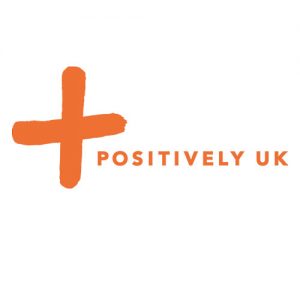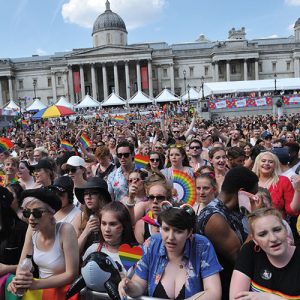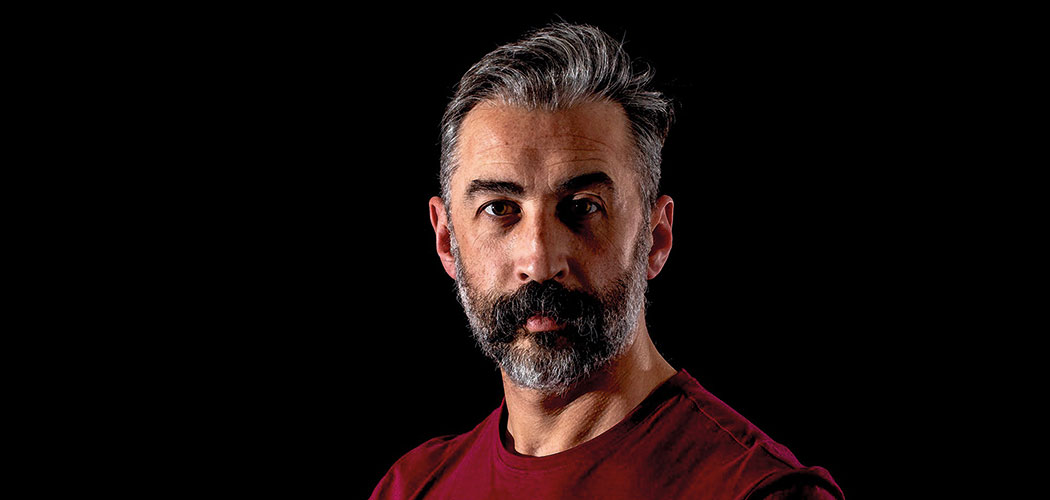Positively UK’s Gay Men’s Project Lead Chris O’Hanlon tells us what Pride means to him and why our community should mark its importance.

Recently I was asked by a friend why I choose to march at Pride in London. While it has been said that I can pull off a pair of hot pants, I was never really one for singing ‘I will survive’ while strutting my stuff. Admittedly, in the past I hadn’t really been a participant of Pride, as I didn’t fully appreciate the significance and impact that an event such as this can have on LGBTQ+ communities not just in London but across the world.
In the UK, LGBTQ+ people were still being convicted for consensual same-sex relationships until its decriminalisation in 1967. After decades of campaigning and public pressure, this led to the creation of the Alan Turing Law being passed, pardoning thousands of gay men who were wrongly convicted. In 2013, the Enigma code breaker, Alan Turing was posthumously pardoned 61 years after being charged for gross indecency relating to homosexual acts.
Globally there are still countries where marching and celebrating pride could get you imprisoned or killed. In the UK, we are fortunate to celebrate many freedoms, but we should not confuse suspended bigotry for true acceptance. There is still a distance to go before the march is no longer needed to gain acceptance and may simply become a celebration of love in all its many diverse forms. The recent rise in homophobic hate crimes is a stark reminder that we cannot be complacent with our continued collective awareness.
A recent YouGov survey commissioned by Stonewall polling over 5000 people demonstrated results that won’t be surprising to the LGBTQ+ communities. One in five LGBTQ+ people (21%) experienced a hate crime or incident due to their sexual orientation and/or gender identity in the last 12 months. Two in five trans people (41%) experienced a hate crime or incident because of their gender identity in the last 12 months and one in six LGB people, who aren’t trans (16%), have experienced a hate crime or incident due to their sexual orientation in the same period. More than a third of LGBT people (36%) say they don’t feel comfortable walking down the street while holding their partner’s hand. This increases to three in five gay men (58%).
Today, LGBTQ+ citizens have most of the same legal rights as non-LGBTQ+ citizens and the UK provides one of the highest degrees of liberty in the world for its LGBTQ+ communities. We have seen protection extended through the Equality Act 2010, Her Majesty’s Armed Forces removing its ban on openly LGBTQ+ individuals serving; transgender rights to legally change their gender since 2005 and most recently same sex marriage in 2014.

Yet while we have made many positive strides towards acceptance, we can never let our guard slip. As global political platforms shift, we are reminded that our freedom should never be taken for granted. After the recent introduction of Brunei’s new anti-gay law that is now in effect, the time for vigilance and continued pressure on our elected representatives has never been so great. While after international backlash and condemnation Brunei may have relaxed their death penalty, never has the support for those who suffer this disgusting and barbaric persecution been so needed. While we have many freedoms, we must never forget those who still fight just to be who they are.
In 2019, maintaining our queer history and showing homage to those who fought and died for our rights is a torch we must all continue to carry. We do, as many in our community cannot. We march in pride, in solidarity, we celebrate and commemorate those who are no longer here on our journey. We come together, shoulder to shoulder to remind our brothers and sisters of the continual fight for equality and true acceptance. We show the world our love, our unity and our differences and can be strengthened by them.
Pride for me, represents an opportunity to relinquish the fears I once had growing up gay in a straight world. Combining the political and celebratory platform, to show future generations why solidarity, compassion and love are so important to our community and as an example to both those who support us and stigmatise us in equal measure.
In my position as Gay Men’s Project Coordinator, I feel truly privileged to work for our community. Supporting and educating continues to be our mission at Positively UK. My hope is that by helping to improve the mental and physical wellbeing of our community, I can increase their confidence, build new connections and hopefully change their lives.
This year marks four years since my own HIV diagnosis and I am marching to honour those who have lost their battle with AIDS, those who still experience homophobia, transphobia and stigma towards HIV and those who are yet to find their voice. I am fortunate to have someone I love very much, and I am aware there are those people, possibly reading this, who are yet to begin their journey. So, in answer to my friend and to those of you who might be considering coming to your first Pride, I am marching because I can celebrate that freedom, with those who have struggled. I stand, as many of you do, for those who face persecution, as I walk and remember that this is our London and love happens here.
For information, support and advice please visit positivelyuk.org














